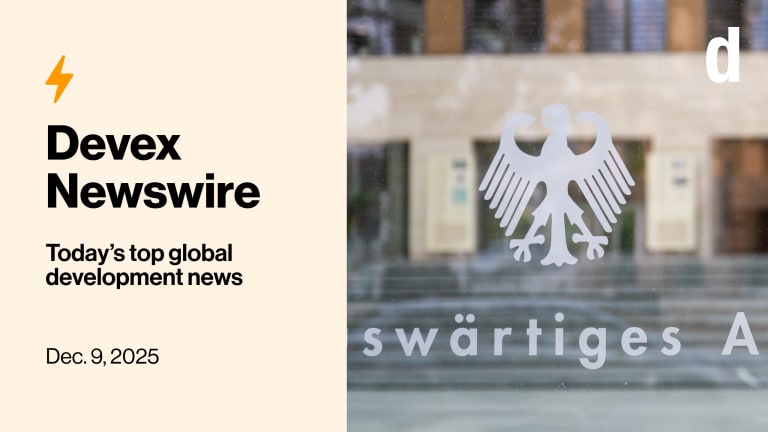NGOs see opportunity in Merkel's financial transaction tax focus
The idea of a European financial transaction tax is making a comeback due to the coronavirus pandemic. But would the money raised go to global development?
BRUSSELS — German Chancellor Angela Merkel has raised aid advocates’ hopes by citing a financial transaction tax among the policies her government plans to push on the European Union agenda later this year. With the EU scrambling to respond to the COVID-19 pandemic at home and abroad, civil society welcomed the renewed interest in the FTT, arguing the money it could generate — estimated at up to €60 billion ($66 billion) a year, depending on which transactions are included and in which countries — should be used for development ends. Maé Kurkjian, policy and advocacy manager at the ONE Campaign in France, pointed out that both French President Emmanuel Macron and German Development Minister Gerd Müller have previously called for a European FTT to be allocated to development goals. There is a long history of debate over a European FTT, and “the idea behind this tax has always been to balance the negative consequences of globalization,” Kurkjian said. “The COVID-19 crisis has emphasized that this is urgently needed.” However, some experts warned that even if the tax goes ahead, the money is unlikely to go to development spending. France and some other European countries already have some form of FTT, though efforts to agree common rules across the EU have stalled. Since 2013, around a dozen EU states discussing a proposal based on the French system have been unable to agree which transactions — such as shares, bonds, and derivatives — should be covered, and how the revenue should be distributed. One proposal last year, championed by France and Germany, would have garnered just €3.45 billion annually. In a video message Saturday, Merkel named an FTT along with an emission trading scheme for ships and planes, and minimum taxation, as questions to be discussed when Germany takes over the six-month presidency of the Council of the European Union in July. It was not clear what kind of FTT scheme the chancellor was referring to, though Friederike Röder, senior director for the EU at social action platform Global Citizen, welcomed the announcement, telling Devex that “the time is ripe” for an ambitious FTT. “We need structural decisions, not just a band-aid, to finance solutions that help us lift the big challenges: climate and health,” Röder said. However, Jakob Schwab, a researcher at the German Development Institute, said that revenue from a possible FTT would most likely go toward meeting the cost of the pandemic within Europe. Still, he said, the tax could indirectly help low-income countries by reducing speculation and “thus stabilizing prices on world markets, particularly for agricultural goods and natural resources.” An EU official told Devex that member states’ taxation revenues normally go to countries’ own coffers, unless they agree to contribute to the EU budget, and that for now no such proposal exists. “It is also important to clarify that a directive does not provide for a specific earmarking,” the official said. “Hence, the FTT does not provide for any specific allocation of the revenues that would be raised.” Röder said that due to the extreme situation created by COVID-19, states could overcome this by creating a mechanism to link the directive to the bloc’s seven-year budget if all member states agreed to participate. The other option, she said, would be a political declaration where countries agreed to spend the revenue on multilateral funds and global public goods. "The rationale for increased spending on global public goods — whether health, economic consequences of COVID on the most vulnerable, or climate change — has never been stronger, but that doesn't mean it will happen,” said Andrew Sherriff, head of European external affairs at the European Centre for Development Policy Management think tank. "The financial transaction tax, like meeting the 0.7% of GNI target on aid, is one of those ideas that has been around for a while but in most cases has lacked the top table political sponsorship to make it happen. For this time to be different, Germany would have to expend a good deal of political capital and find allies to make it happen,” Sherriff said.
BRUSSELS — German Chancellor Angela Merkel has raised aid advocates’ hopes by citing a financial transaction tax among the policies her government plans to push on the European Union agenda later this year.
With the EU scrambling to respond to the COVID-19 pandemic at home and abroad, civil society welcomed the renewed interest in the FTT, arguing the money it could generate — estimated at up to €60 billion ($66 billion) a year, depending on which transactions are included and in which countries — should be used for development ends.
Maé Kurkjian, policy and advocacy manager at the ONE Campaign in France, pointed out that both French President Emmanuel Macron and German Development Minister Gerd Müller have previously called for a European FTT to be allocated to development goals. There is a long history of debate over a European FTT, and “the idea behind this tax has always been to balance the negative consequences of globalization,” Kurkjian said. “The COVID-19 crisis has emphasized that this is urgently needed.”
This story is forDevex Promembers
Unlock this story now with a 15-day free trial of Devex Pro.
With a Devex Pro subscription you'll get access to deeper analysis and exclusive insights from our reporters and analysts.
Start my free trialRequest a group subscription Printing articles to share with others is a breach of our terms and conditions and copyright policy. Please use the sharing options on the left side of the article. Devex Pro members may share up to 10 articles per month using the Pro share tool ( ).
Vince Chadwick is a contributing reporter at Devex. A law graduate from Melbourne, Australia, he was social affairs reporter for The Age newspaper, before covering breaking news, the arts, and public policy across Europe, including as a reporter and editor at POLITICO Europe. He was long-listed for International Journalist of the Year at the 2023 One World Media Awards.








